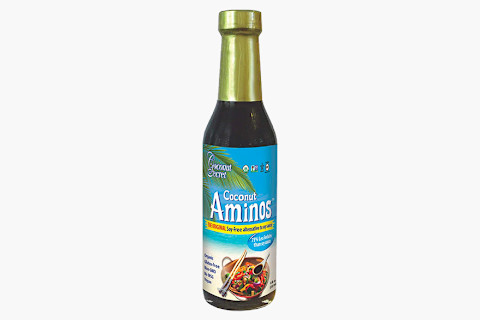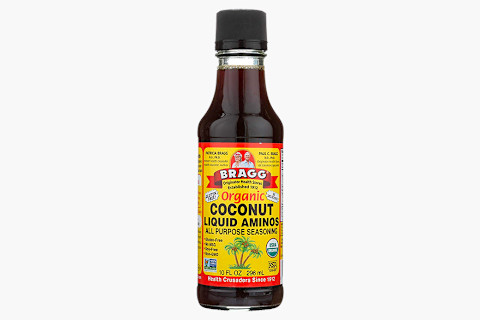Coconut Aminos: How To Use This Must-Have Keto & Paleo Pantry Staple
The foods we eat today are a far cry from what our grandparents would have recognized growing up, with the majority of what's spent on groceries going toward processed fare rather than healthy fats, clean proteins, fruits, and vegetables. And with the rise in food sensitivities and other autoimmune-related health problems, it's clear that we need to start selecting different foods if we want to see different results.
As a functional medicine practitioner, it's my job to empower you to take back control of your health. One of the first steps is making the switch to healthier options of your favorite not-so-healthy foods—which can still be both filling and delicious, not restrictive or boring.
This is where coconut aminos come in. One of my favorite pantry staples for making Asian-inspired dishes, coconut aminos are the perfect substitute for soy sauce in many recipes—and they just so happens to be vegan, paleo, and keto and far lower in sodium. So now, instead of skipping out on your favorite recipes, just make this simple swap. Your taste buds won't notice a major difference, but your body definitely will.
Coconut aminos vs. tamari vs. soy sauce: What's the difference?
In order to make the best decisions about food in the long term, it's important to understand why certain foods may not be the best choice and what actually makes the alternatives healthier. Here, I'll explain the difference between coconut aminos, soy sauce, and tamari—all of which can serve the same culinary purpose but may have significantly different effects on the body, depending on your personal sensitivities and health status.
Soy sauce
Soy is one of the foods that, on the surface, seems like a healthy choice. But from a functional medicine perspective, soy is considered a phytoestrogen (plant-based estrogen), and excessive soy consumption can significantly affect your hormones. For those who have issues with estrogen dominance, soy-containing foods aren't always the best choice. Even if you don't have estrogen problems, most soy in America is extremely processed and genetically modified (and thus, treated with loads of pesticides), making many of its potential health benefits null and void.
Soy sauce is made from fermented soybeans, wheat, salt, yeast culture, and water. While the fermentation can help add in beneficial probiotics—which are great for your gut—the addition of wheat (which contains gluten) can negate those good probiotics and cause a storm of inflammation in your body. This is a no-go for many people, especially those with gut problems or autoimmune conditions. Soy sauce is also extremely high in sodium, containing about 290 mg1 per teaspoon—and who uses just one teaspoon?
Tamari
If you are looking for a gluten-free version of soy sauce, tamari is just that. It's made with fermented soybeans, salt, a yeast culture, and water—everything but the wheat. Tamari can tend to have a stronger flavor than soy sauce since many brands add in more soybeans to make up for the lack of wheat. So, while tamari is gluten-free, it doesn't solve your soy problem. If you're not sensitive to soy, tamari can be a suitable option as long as you opt for a brand that uses organic, non-GMO soybeans. It's still sky-high in sodium, though, with 290 mg per teaspoon.
Coconut aminos
Coconut aminos are a seasoning sauce made from a combination of coconut palms and the nectar of coconut blossoms that are then fermented and mixed with sea salt—and that's it. There are no other additives, making coconut aminos the cleanest alternative to soy sauce. Because they contain no soybeans and are primarily made from coconut, the sauce has a slightly sweeter flavor than soy sauce or tamari, but it still delivers a nice hit of umami. Coconut aminos are also significantly lower in sodium than soy sauce or tamari, containing 90 mg per teaspoon.
Wondering where you can find coconut aminos? They're available at most grocery stores you probably already shop at such as Whole Foods Market or Trader Joe's, or online through Amazon.
Do coconut aminos have health benefits?
Even though coconut aminos contain potassium, magnesium, zinc, and antioxidants, the amount of each is so minimal you'd have to consume an impossibly large amount of this coconut liquid to make a noticeable impact. Other than being much lower in sodium than traditional soy sauce, the main health benefit for choosing coconut aminos is its lack of soy and gluten—both of which could potentially affect your health.
How to cook with coconut aminos.
Because of its slightly sweeter taste, you may be tempted to shy away from this choice. However, when added into recipes, I have found that I don't notice much of a difference—if any—flavor-wise compared to soy sauce. You can also add a little sea salt and garlic powder to your coconut aminos to give it more of that savory/salty flavor of traditional soy sauce. Use coconut aminos in stir-fries, salad dressings, marinades, dipping sauces, soups, and glazes.
I personally use coconut aminos often and it's a condiment I use frequently throughout my plant-based keto book, Ketotarian. Since stir-fries are one of the most common recipes that include soy sauce, I made sure to include a nutrient-packed stir-fry recipe in my book. The addition of coconut milk and apple cider vinegar along with coconut aminos delivers a deliciously nuanced flavor that tastes better than takeout. Check out the recipe below, which happens to be vegan-, keto-, and paleo-friendly.
Coconut Veggie Stir-Fry With Cauliflower Rice
Serves 2
Ingredients
- 3 cups cauliflower florets
- 2 cups broccoli florets
- 5 small pattypan squash, trimmed and quartered
- 2 tablespoons toasted sesame oil
- ⅓ cup thin slivers red onion
- 2 teaspoons grated fresh ginger
- 1 garlic clove, minced
- ¾ cup full-fat coconut milk
- 1 tablespoon coconut aminos
- 1 tablespoon apple cider vinegar
- ½ teaspoon sea salt
- ¼ teaspoon black pepper
- 2 tablespoons coconut oil
- ¼ cup unsweetened large coconut flakes, toasted
- 2 tablespoons snipped fresh cilantro
Method
- Place the cauliflower in the container of a food processor. Cover and pulse until the cauliflower is finely chopped (about the size of rice). Set aside.
- In a large wok, stir-fry the broccoli and squash in the sesame oil over medium-high heat for 4 to 5 minutes, or until the vegetables are crisp-tender. Reduce the heat to medium if the vegetables brown too quickly. Add the onion and stir-fry for 2 minutes more. Transfer the vegetables to a bowl; cover to keep warm.
- To the same wok, add the ginger and garlic. Cook and stir over medium-low heat for 30 seconds. Carefully add the coconut milk, coconut aminos, vinegar, ¼ teaspoon salt, and ⅛ teaspoon pepper. Bring to a boil. Reduce the heat to low and simmer, uncovered, for 5 minutes, or until the sauce is slightly thickened.
- Meanwhile, in a large skillet heat the coconut oil over medium heat. Add the cauliflower rice, the remaining ¼ teaspoon salt, and the remaining ⅛ teaspoon pepper. Cook, stirring frequently, for 3 to 5 minutes, or until the cauliflower is just tender and starting to brown.
- Return the vegetables to the wok. Cook and stir for 1 minute to heat through. Spoon the cauliflower rice evenly onto two serving plates. Top with broccoli mixture and sauce. Sprinkle with the coconut and cilantro and serve with more coconut aminos on top if desired.
Shop these products:

Will Cole, IFMCP, DNM, D.C., is a leading functional medicine expert who consults people around the globe, starting one of the first functional medicine telehealth centers in the world. Named one of the top 50 functional and integrative doctors in the nation, Dr. Will Cole provides a functional medicine approach for thyroid issues, autoimmune conditions, hormonal imbalances, digestive disorders, and brain problems. He is the host of the popular The Art Of Being Well podcast and the New York Times bestselling author of Intuitive Fasting, Ketotarian,The Inflammation Spectrum, and Gut Feelings.
More from the author:
Functional Nutrition Training
Check out Functional Nutrition Coaching
A cutting-edge nutrition deep dive taught by 20+ top health & wellness experts
Learn moreMore from the author:
Functional Nutrition Training
Check out Functional Nutrition Coaching
A cutting-edge nutrition deep dive taught by 20+ top health & wellness experts
Learn more
Will Cole, IFMCP, DNM, D.C., is a leading functional medicine expert who consults people around the globe, starting one of the first functional medicine telehealth centers in the world. Named one of the top 50 functional and integrative doctors in the nation, Dr. Will Cole provides a functional medicine approach for thyroid issues, autoimmune conditions, hormonal imbalances, digestive disorders, and brain problems. He is the host of the popular The Art Of Being Well podcast and the New York Times bestselling author of Intuitive Fasting, Ketotarian,The Inflammation Spectrum, and Gut Feelings.



